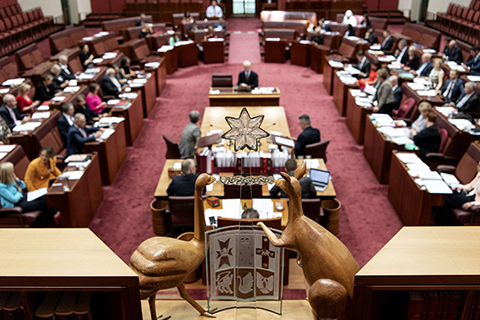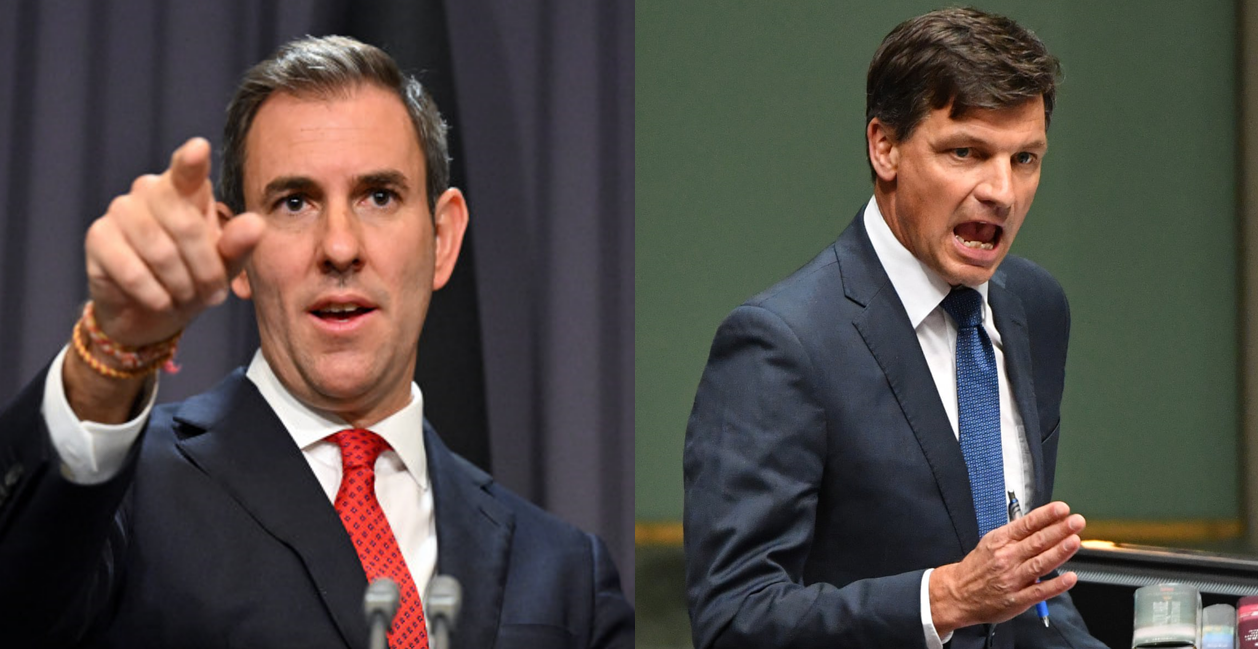During the last sitting week, the Senate engaged in the first round of Senate Estimates since the 2022 Federal Election.
With the Albanese Government’s first Labor Federal Budget handed down to Parliament four weeks ago, the Senate has used the last week to scrutinise the expenditure outlined in appropriation bills (bills that dictate how public funds are allocated). It is a regular and much-observed section of the Australian Parliamentary calendar.
This cycle’s Senate Budget Estimates following a Federal Election have caused Labor to defend and explain its recent Budgetary framework.
The Albanese Government, whilst still working to move legislation through Parliament, had the task of setting out the agenda of their October budget, raising Industrial Relations bills and plans to restructure the public service.
Last Week – Uluru Statement from the Heart
The Uluru Statement from the Heart has recently been awarded the Sydney Peace Prize – Australia’s only international Prize for Peace, based on over 200 nominations from the community. The Prize has chosen the Statement as a ‘stand-out winner ‘for bringing together Australia’s First Nations Peoples around a clear and comprehensive agenda for healing and peace within our nation.
The Uluru Statement from the Heart is an invitation to Australian people from First Nations Australians. It asks Australians to walk together to build a better future by establishing a First Nations Voice to Parliament enshrined in the Constitution and establishing a Makarrata Commission for treaty-making and truth-telling.
In 2015, a Referendum Council was appointed by Prime Minister Malcolm Turnbull and the Leader of the Opposition, the Hon Bill Shorten MP. Its purpose was to advise on progress toward a referendum to recognise Aboriginal and Torres Strait Islander peoples in the Australian Constitution.
Senior members of the Government have repeatedly discussed the topic since the Albanese Government claimed victory in May 2022. Incoming Prime Minister Anthony Albanese proclaimed on behalf of the Australian Labor Party, “I commit to the Uluru Statement from the Heart in full.” The commitment to a referendum on a First Nations Voice to Parliament is a significant moment in Australia’s history. It allows the Australian community and business leaders to demonstrate their commitment to First Nations Australians.
A referendum question announced by the Prime Minister will ask of the Australian people; “Do you support an alteration to the Constitution that establishes an Aboriginal and Torres Strait Islander Voice?” In a recent Boyer Lecture, Indigenous leader Noel Pearson acknowledged the difficulties a success in the forthcoming referendum must overcome. He particularly noted that “unlike [the] same-sex marriage [referendum], there is not quite the requisite empathy of love to break through the prejudice, contempt and yes, violence, of the past. Australians do not have Aboriginal people within their circles of family and friendship with whom they can share fellow feelings.” Comments like these signal a need for public education on the role of a Voice and what it does and does not entail, along with strong engagement and comprehensive support from civic and business leaders.
The Senate Estimates
The Senate Estimates are a crucial function of the Parliament.
Building upon the Senate’s ‘House of Review’ status, it allows the Senate Legislation Committees to scrutinise the expenditure outlined in appropriation bills. Estimates enable the Parliament to hold the Government and bureaucracy to account.
In a typical Parliamentary sitting calendar, there are three sessions of Senate Estimates, Budget Estimates which are typically held in May or June; Additional Estimates, which are held in February and Supplementary Budget Estimates, which are held in October or November.
When appearing in front of a Senate Estimates session, the relevant minister will be accompanied by senior public servants from the corresponding department and will answer questions from the Committee members on a range of topics relating to the Department’s or contracted organisation’s operations and expenditure.
However, like with many of the political processes in Australia, Senate Estimates have undergone somewhat of an evolution.
Senate Estimates sessions are now no longer merely serving as a function to hold the bureaucracy to account like in the days of former ALP Senators John Faulkner and Robert Ray, with Estimates now used as a way for the Government to show how it is implementing its agenda.
Senate Estimate Preparation
The Estimates cover issues and policy matters across the entire Federal Government. Some of these likely impact the operations of your organisation.
Stakeholders are offered the unique opportunity to engage with Government and the Public Service. In the weeks before appearing before the Senate, senior officials gather relevant information to ensure they have a firm grasp of the necessary details and relevant facts regarding their departmental responsibilities and actions.
During Senate Estimates, senior public servants from the Government’s key departments and agencies take turns appearing in front of Senate Committee hearings to answer questions about their respective areas of responsibility. Appearing before the Committee is quite a demanding time for those involved, as they must balance providing accurate responses to questions while trying not to be drawn into the sometimes inevitable political point-scoring exercise that Senate Estimates can become.
Stakeholders should carefully monitor and engage with this process, as some issues will be very relevant to them. First and foremost, the Senate Estimates provide an opportunity for you and your organisation to help inform the information gathered by public servants.
A word of caution
Despite the opportunity that Senate Estimates presents to stakeholders to engage with the Public Service, proceed with caution.
In the lead-up to the Senate Estimates, senior public servants will be fully immersed in the preparation process. During this time, they will unlikely welcome meeting requests or outreach. Generally, stakeholders should proceed cautiously when attempting to engage during this period.
Additionally, be aware of the politics around critical areas of questioning by the Opposition and Crossbench. An excessive focus on one issue could indicate an opportunity for the Opposition to attack the Government for failing to manage certain policy areas. Stakeholders should be wary of getting caught in these political point-scoring exercises.
Keeping this in mind, it may be wise to offer to support senior public servants with questions taken on notice if your organisation can provide relevant information.
Finally, do your research. Understand which members of the Parliament will be sitting and engaging stakeholders with questions. They may be a former minister in the portfolio area, pushing to ignite a debate on social or economic issues or searching for a higher standing within their party and the political community. Regardless of why they are sitting on these committees, understanding the background of these committee members is critical to survive and thrive in Senate Estimates.
Header Image Creator: David Foote
Latest posts by Nexus APAC (see all)
- United Kingdom General Election 2024: An Overview - April 15, 2024
- Australian Voters Go to the Polls - February 26, 2024
- Secretaries of Federal Departments – An Overview - February 1, 2024



